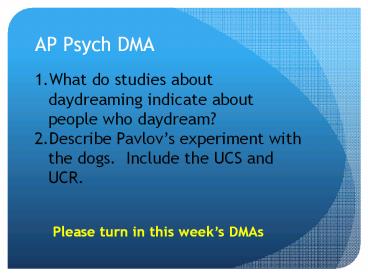AP Psych DMA - PowerPoint PPT Presentation
1 / 34
Title:
AP Psych DMA
Description:
AP Psych DMA. Please turn in this week s DMAs. What do studies about daydreaming indicate about people who daydream? Describe Pavlov s experiment with the dogs. – PowerPoint PPT presentation
Number of Views:132
Avg rating:3.0/5.0
Title: AP Psych DMA
1
AP Psych DMA
- What do studies about daydreaming indicate about
people who daydream? - Describe Pavlovs experiment with the dogs.
Include the UCS and UCR.
Please turn in this weeks DMAs
2
Todays Agenda
- DMA
- Reminders
- Buy back info - quiz
- Review for Final Exam
- Chapters 7 8
- Homework
- Final Exam Friday, Feb. 3rd
- Quiz on chap. 5, 6,7 8 Monday, Jan. 30th
- Quiz on Chap 9, 10, 11 Prologue Wednesday,
Feb. 1st
3
Make sure that you download yesterdays
PowerPoint file for the Chapter 6 info
- AP Psych calendar at www.wheelerswiki.pbworks.com
4
Quiz Buy-Back
- Due Monday at the beginning of class
- You will not have class time to work on it.
- Test questions, answers answer key on the front
table - For EACH question you missed write
- The question
- Explain why your answer is wrong
- The correct answer why that answer is correct
5
Chapter 7
6
Waking Consciousness
- Consciousness
- our awareness of ourselves and our environments
7
What is hypnosis?
- Discuss with a neighbor
8
Hypnosis
- Posthypnotic Amnesia
- supposed inability to recall what one experienced
during hypnosis - induced by the hypnotists suggestion
- easy to hypnotize people with rich fantasy
lives.
9
Hypnosis
- Subjects were told to throw acid in a persons
face. - Hypnotized unhypnotized people can behave in
the same way.
10
Explaining Hypnosis
11
Organize these drugs into the correct category
- Drug
- Category
- Marijuana
- Alcohol
- Heroin
- Cocaine
- Ecstasy
- Nicotine
- Meth
- Stimulant
- Depressant
- Hallucinogen
12
Psychoactive Drugs
13
Brain Waves and Sleep Stages
- Alpha Waves
- slow waves of a relaxed, awake brain
- Delta Waves
- large, slow waves of deep sleep
- Hallucinations
- false sensory experiences
14
That is circadian rhythm?
- Discuss with a neighbor
15
REM Sleep
- Nervous system is highly active
- Voluntary muscles hardly move
16
Sleep
- REM Rebound
- REM sleep increases following REM sleep
deprivation - Dreams
- Usually occur during REM sleep
- Sleep cycle
- Repeats itself every 90 minutes
17
Dreams Freud
- Sigmund Freud
- wish fulfillment
- discharge otherwise unacceptable feelings
- Violence, erotic wishes...
- Manifest Content
- remembered story line
- Latent Content
- underlying meaning
18
Chapter 8
19
With a neighbor
- Who was Baby Albert?
- Who were Watson and Rayner?
- What is classical conditioning?
- Brainstorm 3 examples of operant conditioning.
20
Define brainstorm examples of these termsWith
a neighbor.
- UCS
- UCR
- CS
- CR
21
Classical Conditioning
- Spontaneous Recovery
- reappearance, after a rest period, of an
extinguished CR - Generalization
- tendency for stimuli similar to CS to elicit
similar responses - What is extinction?
22
Lets create a cognitive map
- Turn to a neighbor and give them directions to
your house. - The visual image in your brain is your cognitive
map
23
Compare/contrast intrinsic extrinsic motivation.
- Discuss with a neighbor
24
Operant Conditioning
- Operant Conditioning
- type of learning in which behavior is
strengthened if followed by reinforcement or
diminished if followed by punishment - Law of Effect
- Thorndikes
- Behaviors followed by favorable consequences
become more likely - Behaviors followed by unfavorable consequences
become less likely
25
Operant Conditioning
- Reinforcer
- any event that strengthens the behavior it
follows - Shaping
- operant conditioning procedure
- in which reinforcers guide behavior toward
closer approximations of a desired goal
26
Principles of Reinforcement
- Primary Reinforcer
- satisfies a biological need
- Conditioned Reinforcer
- stimulus that gains its reinforcing power through
its association with primary reinforcer - secondary reinforcer
27
Operant Chamber
- Skinner Box
- chamber with a bar or key that an animal
manipulates to obtain a food or water reinforcer - contains devices to record responses
28
Schedules of Reinforcement
- Fixed Ratio (FR)
- reinforces a response only after a specified
number of responses - faster you respond the more rewards you get
- very high rate of responding
29
Schedules of Reinforcement
- Variable Ratio (VR)
- reinforces a response after an unpredictable
number of responses - average ratios
- like gambling, fishing
- very hard to extinguish because of
unpredictability
30
Schedules of Reinforcement
- Fixed Interval (FI)
- reinforces a response only after a specified time
has elapsed - response occurs more frequently as the
anticipated time for reward draws near
31
Observational Learning
- Observational Learning
- learning by observing others
- Modeling
- process of observing and imitating a specific
behavior - Prosocial Behavior
- positive, constructive, helpful behavior
- opposite of antisocial behavior
32
What was Banduras famous experiment?What were
his findings?
- Think about little kids beating up a Bobo doll.
33
What is punishment?
- Discuss with a neighbor
34
Review/study chapters 5, 6, 7 8
- You have a quiz on Monday































